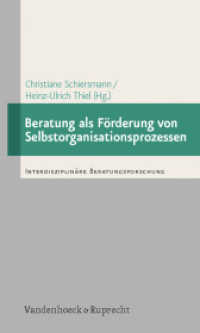基本説明
This book examines the theory and practice of argument in primary, secondary and tertiary education. Chapters discuss the nature, forms and functions of argument and its role in teaching and learning.
Full Description
Learning to argue is one of the central objectives of education. Whether it be conducting a formal debate, participating in a group discussion, writing an essay, a critique or a persuasive appeal, the ability of the student to employ argument and to anticipate and evaluate the arguments of others will generally be an important measure of achievement. This book examines the theory and practice of argument in primary, secondary and tertiary education. Several of its chapters offer theoretical discussion of the forms and functions of argument within social, philosophical, historical and rhetorical contexts. Others contain critical analyses of spoken and written argument and show how these are part of the learning process. A number of the chapters provide ideas for developing the skills of argument. The book, whose contributors represent a range of international and disciplinary perspectives, is an important resource for teachers and researchers sharing an interest in the rich and complex relations between language, thinking and education.
Contents
Situating the teaching and learning of arguments within historical contexts, M. Daly Goggin; ushering in the tigers of wrath - playfulness and rationality in learning to argue, S. Clarke; narrative and arguemnt, argument in marrative, Mike Baynham; argument as a key concept in teacher education, G. Harvard and R. Dunne; argument, dialogue and religious pluralism - reflections on the current state of religious education in Britain, Howard Gibson and Jo Backus; argument and science education, Carol J. Boulter and John K. Gilbert; raised and erased voices - what special cases offer to argument, J. McGonigal; extending children's voices - argument and the teaching of philosophy, Patrick Costello; conflict and conformity - the place of argument in learning a discourse, S. Mitchell; signalling valuation through argumentative discourse, M.A. Mathison; thinking through controversy - evaluating written arguments, C.A. Hill; negotiating competing voices to construct claims and evidence - urban American teenagers rivalling anti-drug literature, E. Long et al; a different way to teach the writing of argument, A. Berner and W. Boswell; argumentative writing and the extension of literacy, P. O'Rourke and M. O'Rourke.








